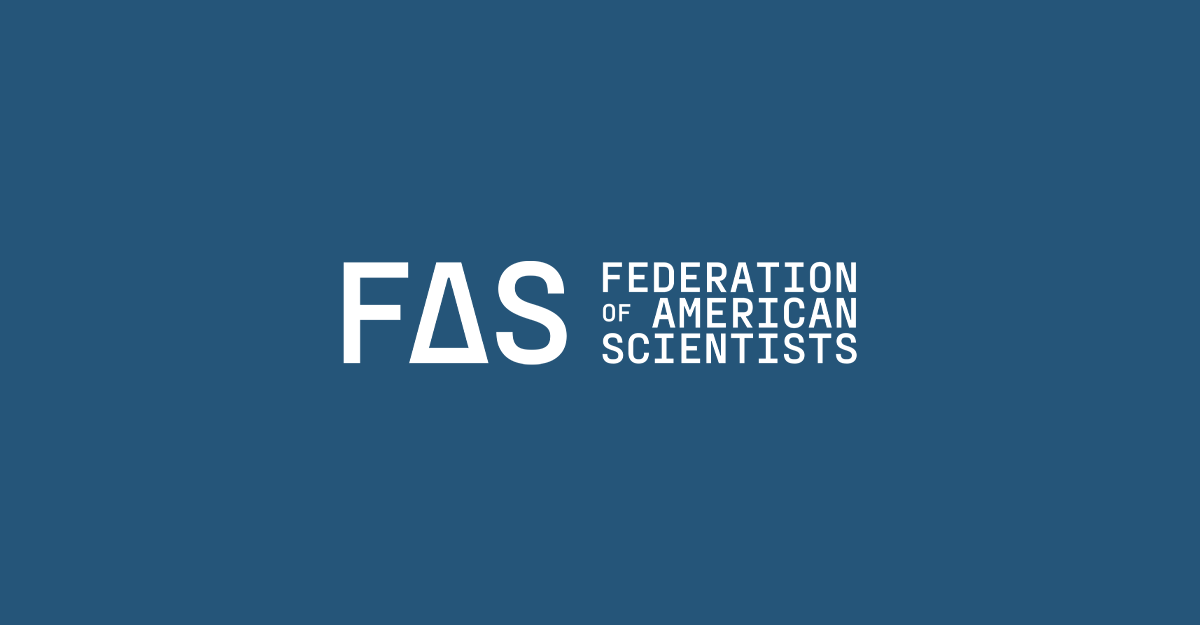
Federation of American Scientists Among Leading Technology Organizations Pushing Congress to Support Responsible AI Innovation NIST Funding Request
A letter asking congressional appropriators to fully fund the National Institute of Standards and Technology budget request for AI-related work in the upcoming fiscal year signed by more than 80 organizations, companies, and universities.
WASHINGTON, D.C., April 23, 2024 — Today, leading AI and technology advocacy organizations Americans for Responsible Innovation (ARI), BSA | The Software Alliance, Center for AI Safety (CAIS), Federation of American Scientists (FAS), and Public Knowledge sent a joint letter calling on Congress to prioritize funding for the National Institute of Standards and Technology (NIST) fiscal year 2025 budget request.
The letter, which was signed by more than 80 industry, civil society, nonprofit, university, trade association, and research laboratory groups, urges investment in NIST’s effort to advance AI research, standards, and testing, including through the agency’s recently established U.S. AI Safety Institute.
“As cutting-edge AI systems rapidly evolve, ensuring NIST has the resources it needs to drive responsible AI innovation is essential to maintain America’s technological leadership and safeguard our future,” the organizations wrote.
The joint advocacy effort, backed by industry, academia, and groups from across the AI policy spectrum, calls for the establishment of an effective AI governance framework through NIST, including technical standards, test methods, and objective evaluation techniques for the emerging technology. In addition to asking congressional leaders to meet the agency’s $48 million request for its Scientific and Technical Research Services account, the groups also expressed concern over cuts in the most recent federal budget, which could jeopardize sustainable and responsible AI development in the U.S.
“NIST cannot fulfill its mission to advance responsible AI innovation without immediate, adequate financial support. To pinch pennies now would be a shortsighted mistake, with both the future of responsible AI and global competitiveness on a key emerging technology hanging in the balance. We at the Federation of American Scientists are proud to co-lead this request because of our longstanding commitment to responsible AI innovation and our critical work identifying needs across AI risk measurement, management, and trustworthy AI,” said Dan Correa, CEO of FAS.
“This funding will enable NIST to continue the necessary and important work of developing artificial intelligence to balance risk and reward,” said Clara Langevin, FAS AI Policy Specialist.
The letter, which was submitted to Senate Appropriations Chair Patty Murray (D-WA), Vice Chair Susan Collins (R-ME), and subcommittee leaders Jeanne Shaheen (D-NH) and Jerry Moran (R-KS), as well as House Appropriations Chair Tom Cole (R-OK), Ranking Member Rosa DeLauro (D-CT), and subcommittee leaders Hal Rogers (R-KY) and Matt Cartwright (D-PA), can be found here.
In addition to Americans for Responsible Innovation (ARI), BSA | The Software Alliance, Center for AI Safety (CAIS), Federation of American Scientists (FAS), and Public Knowledge, the letter is signed by Accountable Tech, AI Forensics, AI Policy Institute, Alliance for Digital Innovation, Amazon, American Civil Liberties Union, Association for the Advancement of Artificial Intelligence, BABL AI, Backpack Healthcare, Bentley Systems, Box, Capitol Technology University, Carnegie Mellon University, Center for AI and Digital Policy, Center for AI Policy, Center for Democracy & Technology, Cisco, CivAI, Clarifai, Cohere, Common Crawl Foundation, Credo AI, Docusign, Drexel University, Duke University, Duquesne University — Carl G Grefenstette Center for Ethics, EleutherAI, Encode Justice, FAIR Institute, FAR AI, Fight for the Future, ForHumanity, Free Software Foundation, Future of Life Institute, Future of Privacy Forum, Gesund.ai, GitHub, Hewlett Packard Enterprise, Hitachi, Hugging Face, Human Factors and Ergonomics Society, IBM, Imbue, Inclusive Abundance Initiative, Information Ethics & Equity Institute, Information Technology Industry Council (ITI), Institute for AI Policy & Strategy (IAPS), Institute for Progress, Intel, ITIF Center for Data Innovation, Johns Hopkins University, Kyndryl, Leela AI, LF AI & Data Foundation, Lucid Privacy Group, Machine Intelligence Research Institute, Massachusetts Institute of Technology, Mastercard, Microsoft, National Retail Federation, New America’s Open Technology Institute, OpenAI, Palantir, Public Citizen, Responsible AI Institute, Safer AI, Salesforce, SandboxAQ, SAP, SAS Institute, Scale AI, SecureBio, ServiceNow, The Future Society, The Leadership Conference’s Center for Civil Rights and Technology, Transformative Futures Institute, TrueLaw, Trustible, Twilio, UC Berkeley, Center for Human-Compatible AI, University at Buffalo — Center for Embodied Autonomy and Robotics, University of South Carolina — AI Institute, and Workday.
###
ABOUT FAS
The Federation of American Scientists (FAS) works to advance progress on a broad suite of contemporary issues where science, technology, and innovation policy can deliver dramatic progress, and seeks to ensure that scientific and technical expertise have a seat at the policymaking table. Established in 1945 by scientists in response to the atomic bomb, FAS continues to work on behalf of a safer, more equitable, and more peaceful world. More information at fas.org.
The Federation of American Scientists supports Congress’ ongoing bipartisan efforts to strengthen U.S. leadership with respect to outer space activities.
By preparing credible, bipartisan options now, before the bill becomes law, we can give the Administration a plan that is ready to implement rather than another study that gathers dust.
Even as companies and countries race to adopt AI, the U.S. lacks the capacity to fully characterize the behavior and risks of AI systems and ensure leadership across the AI stack. This gap has direct consequences for Commerce’s core missions.
As states take up AI regulation, they must prioritize transparency and build technical capacity to ensure effective governance and build public trust.